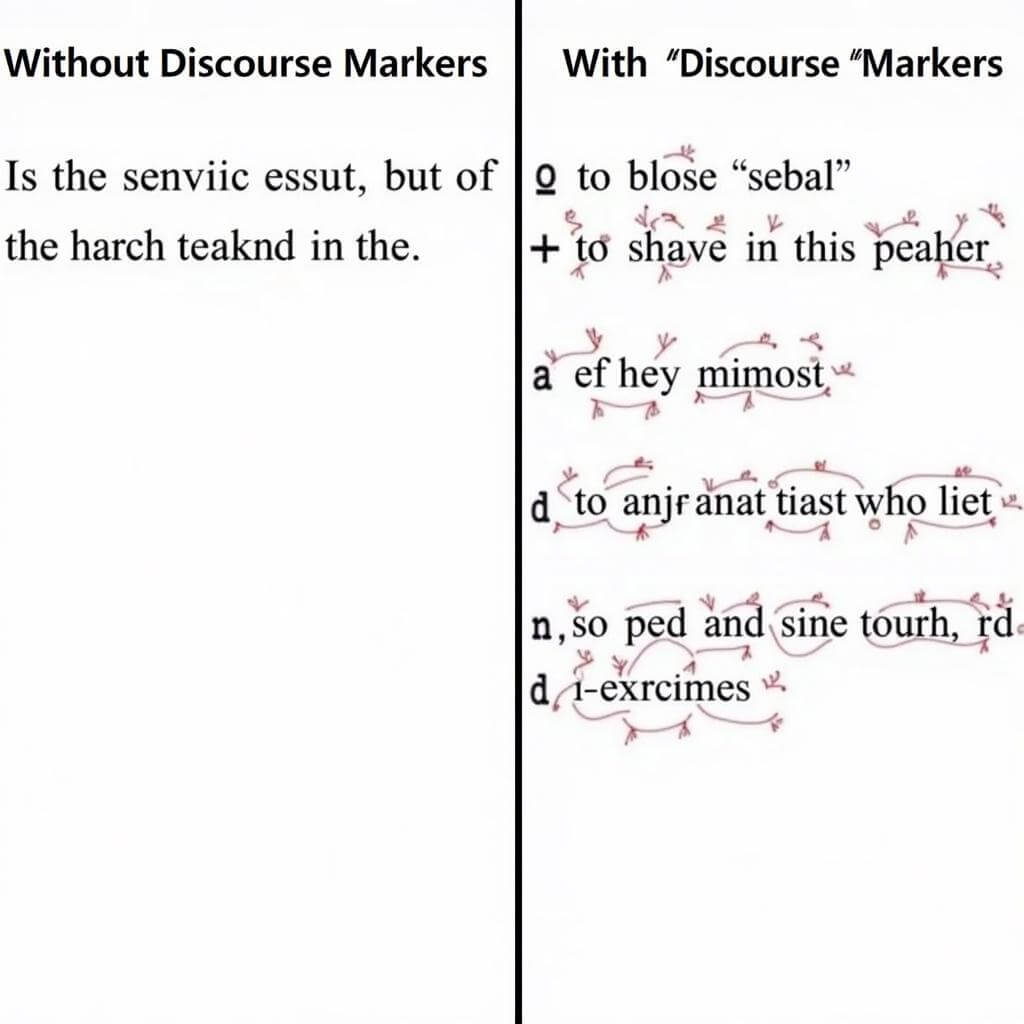Discourse markers play a crucial role in IELTS writing, helping to create cohesive and well-structured essays. These linguistic tools serve as signposts, guiding the reader through your thoughts and arguments. By effectively using discourse markers in your IELTS writing, you can significantly enhance your coherence and cohesion score, ultimately boosting your overall band.
Understanding Discourse Markers
Discourse markers are words or phrases that connect different parts of a text, indicating relationships between ideas and helping to organize your writing. They are essential for creating a logical flow in your essay and demonstrating your ability to articulate complex thoughts clearly.
Types of Discourse Markers
- Sequencing: first, secondly, finally
- Adding information: moreover, furthermore, in addition
- Contrasting ideas: however, on the other hand, nevertheless
- Cause and effect: therefore, as a result, consequently
- Exemplifying: for instance, such as, for example
- Summarizing: in conclusion, to sum up, overall
How to use discourse markers in IELTS?
Strategies for Using Discourse Markers Effectively
1. Choose the Right Marker for the Context
Select discourse markers that accurately reflect the relationship between your ideas. For example, use “however” to introduce a contrasting point, not to add similar information.
2. Avoid Overuse
While discourse markers are important, overusing them can make your writing feel cluttered and unnatural. Aim for a balance – use them where they genuinely aid understanding and flow.
3. Vary Your Choices
Don’t rely on the same few discourse markers throughout your essay. Demonstrate your language proficiency by using a range of markers appropriately.
4. Practice with Different Essay Types
Different IELTS essay types may require different discourse markers. For instance, argument essays might use more contrasting markers, while process essays rely more on sequencing markers.
5. Use Advanced Discourse Markers
To aim for higher band scores, incorporate more sophisticated discourse markers into your writing. Instead of simple markers like “but” or “so”, try using “nevertheless” or “consequently”.
Using advanced grammar for higher scores
Common Mistakes to Avoid
- Misusing discourse markers
- Overrelying on basic markers
- Placing markers incorrectly in sentences
- Using markers that don’t fit the context
- Forgetting to use markers altogether
Dr. Emma Thompson, an IELTS examiner with 15 years of experience, emphasizes, “The appropriate use of discourse markers can be the difference between a Band 6 and a Band 7 in coherence and cohesion. It’s not just about using them, but using them correctly and effectively.”
Practical Examples
Let’s look at how discourse markers can improve an IELTS essay:
Without discourse markers:
“Technology has changed education. Students can access information easily. Traditional teaching methods are becoming outdated. Schools need to adapt their curricula.”
With discourse markers:
“Firstly, technology has revolutionized education. As a result, students can now access information with unprecedented ease. However, this means that traditional teaching methods are rapidly becoming outdated. Therefore, schools need to adapt their curricula to keep pace with these changes.”

Integrating Discourse Markers with Other IELTS Writing Skills
While mastering discourse markers is crucial, it’s equally important to integrate them with other essential IELTS writing skills:
- Vocabulary: Use a wide range of vocabulary alongside your discourse markers to showcase your language proficiency.
- Grammar: Ensure your grammar is accurate when using discourse markers. Likewise, pay attention to sentence structure and variety.
- Task Achievement: Use discourse markers to clearly organize your ideas and fully address all parts of the task.
- Coherence and Cohesion: Discourse markers are a key component of this criterion, helping to create a well-structured and logically flowing essay.
Practice Exercises
To improve your use of discourse markers, try these exercises:
- Gap-fill: Remove discourse markers from a sample essay and try to replace them appropriately.
- Rewriting: Take a poorly structured paragraph and rewrite it using suitable discourse markers.
- Categorization: Group discourse markers by their function (e.g., contrasting, summarizing) to better understand their usage.
How to use linking words in IELTS writing?
Conclusion
Mastering the use of discourse markers in IELTS writing is a powerful way to enhance your essay structure and boost your score. By understanding their types, practicing their usage, and avoiding common mistakes, you can significantly improve your writing’s coherence and cohesion. Remember, the key is not just to use discourse markers, but to use them effectively and appropriately. With consistent practice and attention to context, you’ll be well on your way to achieving a higher band score in IELTS writing.
Be that as it may, always remember that discourse markers are just one aspect of good writing. Combine them with strong content, accurate grammar, and varied vocabulary for the best results.
FAQ
How many discourse markers should I use in my IELTS essay?
There’s no fixed number, but aim for a natural flow. Generally, 1-2 markers per paragraph is a good guideline, but this can vary depending on the essay length and complexity.
Can using too many discourse markers lower my score?
Yes, overuse can make your writing seem forced or unnatural. Focus on quality over quantity, using markers where they genuinely improve coherence.
Are some discourse markers more advanced than others?
Indeed, some markers are considered more sophisticated. For example, “nevertheless” is often seen as more advanced than “but”. However, correct usage is more important than perceived complexity.
Should I memorize a list of discourse markers for the IELTS test?
While knowing a range of markers is helpful, it’s more important to understand how to use them correctly. Focus on practicing their usage in context rather than rote memorization.
How can I practice using discourse markers effectively?
Read high-quality articles and essays, noting how they use discourse markers. Then, practice incorporating these into your own writing, getting feedback from a teacher or language exchange partner.